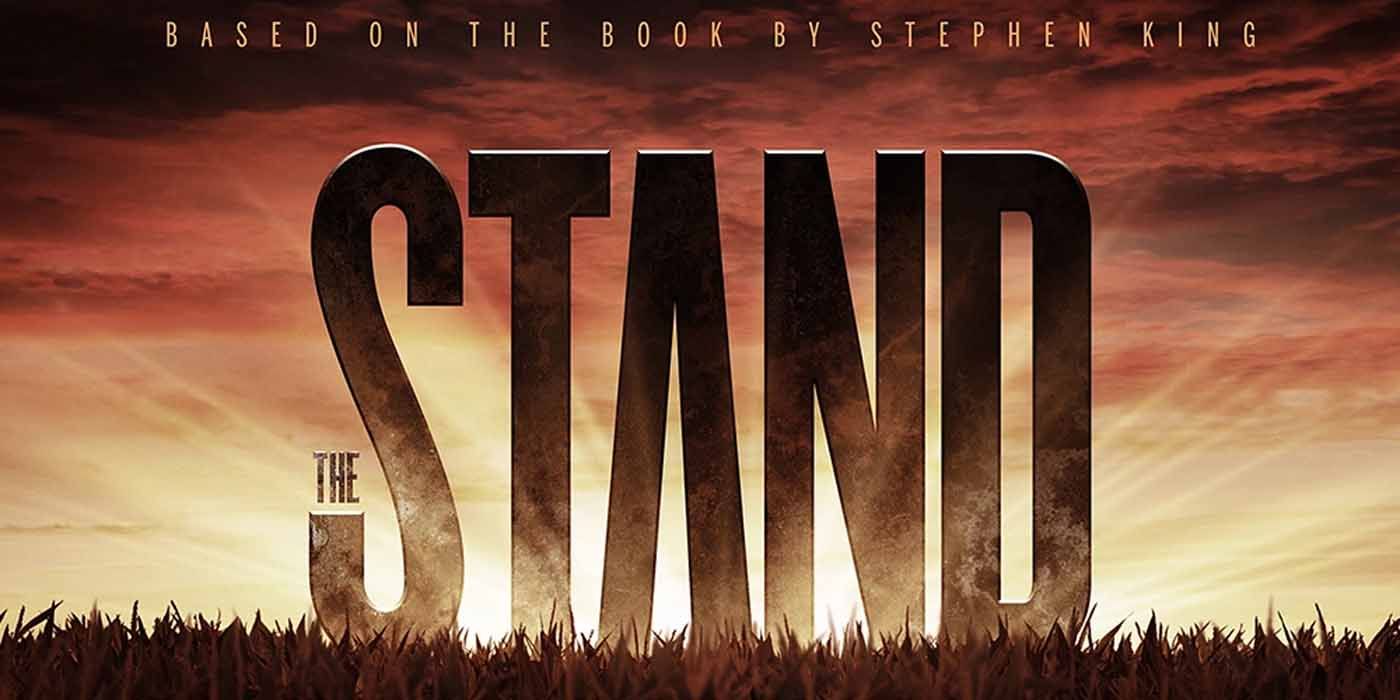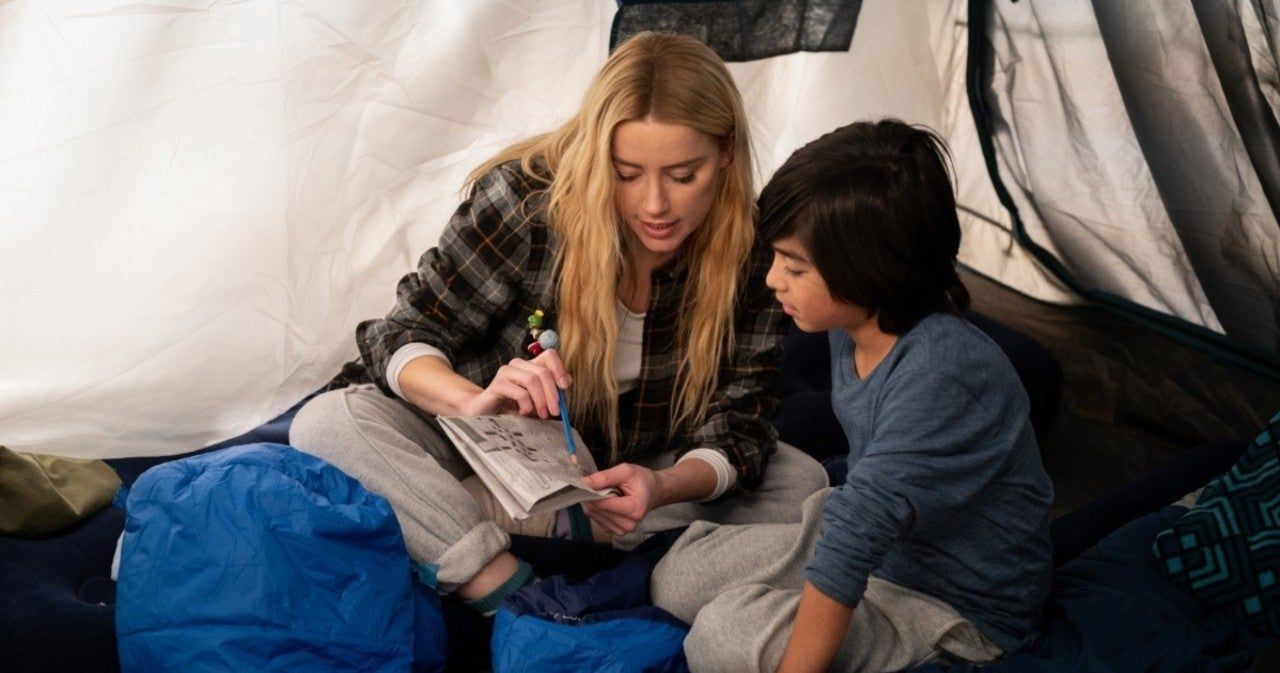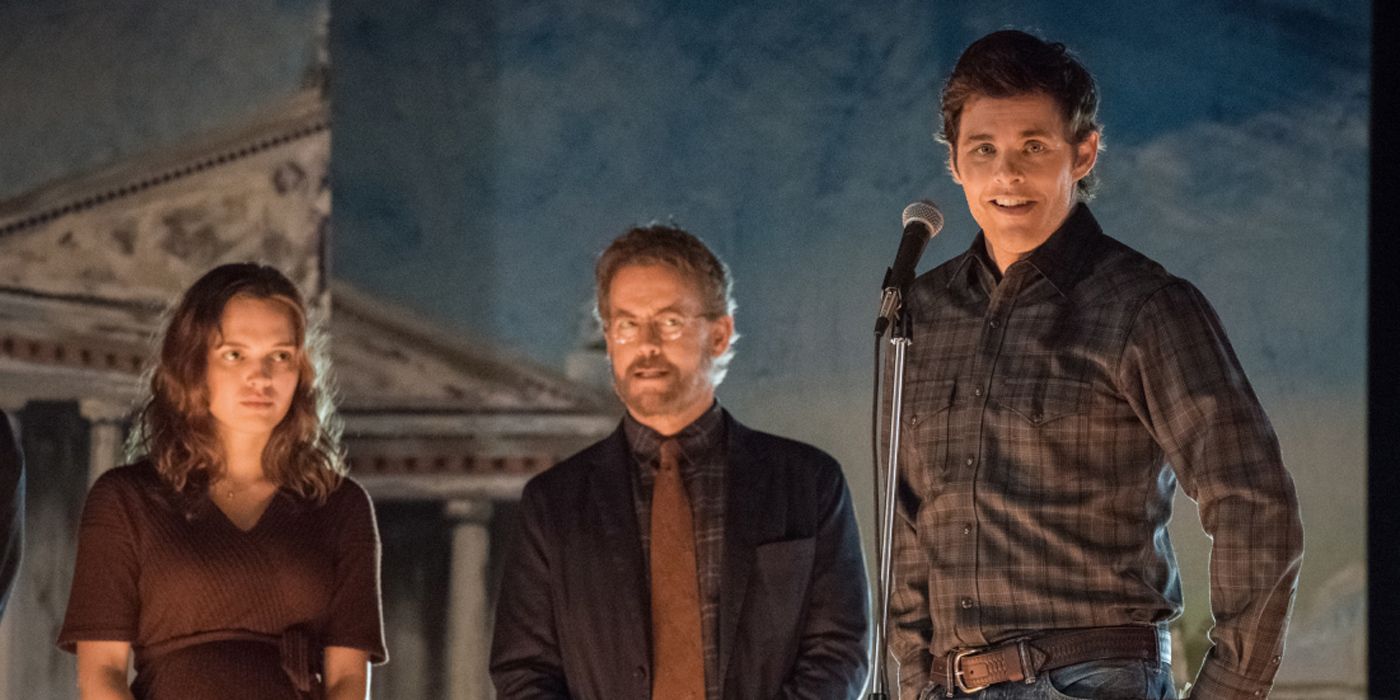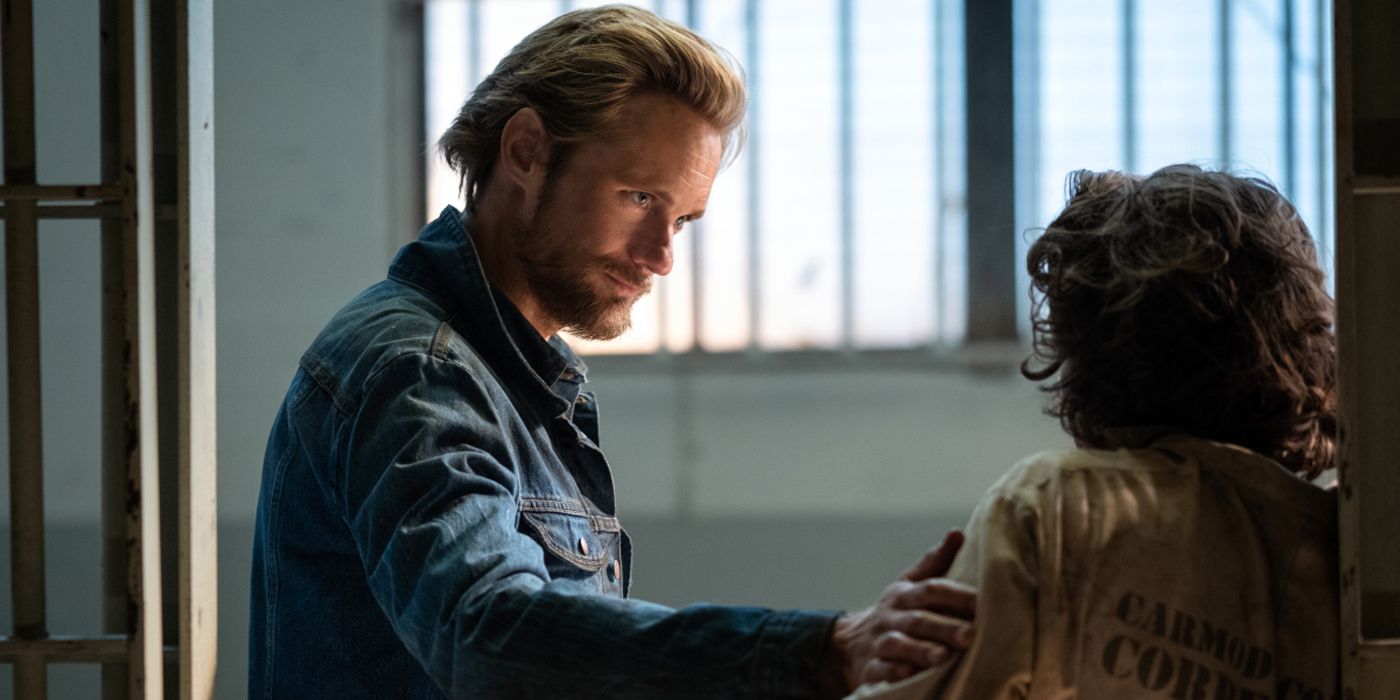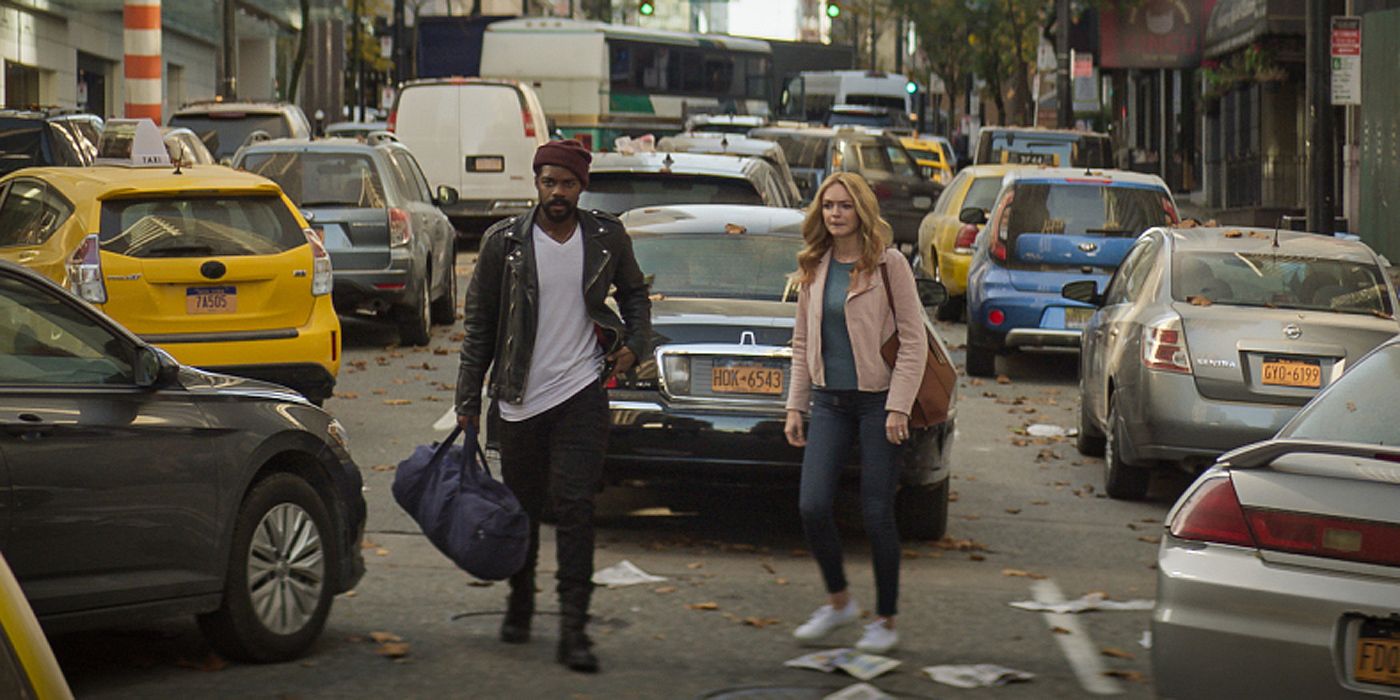Of all the Stephen King novels in the fan-favorite author's extensive bibliography, none perhaps looms larger than The Stand. After numerous attempts to adapt the novel as a feature film, CBS All Access has launched a nine-episode miniseries following the two rival communities that rise in the wake of a devastating contagion that decimates the world. Developed for television by Josh Boone and Benjamin Cavell, the miniseries boasts an all-star cast and a coda to the original story penned by King himself.
In exclusive interview with CBR, Cavell shared his experiences showrunning the adaptation, working with the cast and King family to update the classic story and developing the ultimate antagonist in Alexander Skarsgard's Randall Flagg.
This is a project that has been in development for a very long time, as a feature film and now as a miniseries. How did your involvement come about with it?
Benjamin Cavell: Julie McNamara, the head of CBS All Access, approached me almost three years ago now. She approached and asked if I would be interested in doing The Stand as an event series.
You're right, it's been in development...George Romero was developing it back in the day, and [Ben] Affleck was developing it at one point. and Josh Boone was doing it as a feature. I don't know how you do it as a feature. The thing that I was so excited about, when Julie approached me about it, was this sort of hybrid TV-feature, this incredibly high-end limited event series that maybe started with the first season of True Detective, where you're signing on actors who would never sign on for an ongoing series. A feature-level cast with a feature-level budget and feature-level effects. That medium is the only way to do The Stand righteously.
I have a nine-hour feature; I don't know how you do it otherwise, so that was incredibly exciting, obviously. And Josh had been developing it as a feature and he's the first to say he's a filmmaker and not a showrunner so we knew that he was going to direct our premiere and finale -- which turned out to be King's coda -- and those are the two Josh is an executive producer on, so he could focus on his two-hour fan feature that he's been dreaming of for all these years. Obviously, I don't want to say that his episodes [aren't a part of] the rest -- of course they are, that's the show we're making -- we have a bunch of brilliant directors who brought their own style and vision to it.
Vincenzo Natali directs our seventh and eighth episodes, which include some of the really big, memorable set pieces from the book, and those are just so beautifully done. Tucker Gates, who directed our second episode, did a phenomenal job. Danielle Krudy and Bridget Savage Cole, who directed episodes three and four, and the great Chris Fisher who directs episodes five and six, they all just bring such different sensibilities to it, but the collaboration was such that it all fits into a coherent whole, I think, and that's obviously what we set out to do.
You and Taylor worked closely with the cast of Justified to develop those characters and you worked with this extensive ensemble cast to modernize their characters for this event series, in comparison to the 1994 miniseries and the 1978 novel. How was that modernization process?
Cavell: Yeah, we're modernizing a 40+ year-old book, we knew we were going to have to do a lot of modernizing no matter what. As you said, Taylor and I cut our teeth working closely with actors and we both feel that is the way to get the best work is to hire really smart, committed actors and welcome them into the process to collaborate with them in developing their characters. It's also true that we have the enormous advantage of having just a whole slew really special actors; each of them were really committed to doing this, pulling this off and doing right by the iconic character they were playing.
That, frankly, is what set this experience apart from is that everybody who was involved in this show felt a responsibility to do right by it, to do right by this book that means so much to so many fans and means so much to all of us. Our head electrician brought his first-edition signed copy of The Stand to show me in this little plastic case. That's just not what happens on every show where every single member of the cast is so single-mindedly focused on bringing their A-game and their best work. That's just inspiring, and if you can't be inspired by being part of that, you're in the wrong business. [Laughs]
It's easy to collaborate with actors who really want to collaborate and their agenda is really to make this performance better. Even if you disagree, how annoyed can you be if they're bringing all this passion and floating all these ideas that might not fit into the particular story you're telling? You don't want to turn off anybody's passion, it's what we're here for!
Randall Flagg may be the best character King ever created; he's shown up in a lot of King's work. How did you develop Alexander Skarsgard's performance and role in this version of the story? Even when he isn't on screen, his presence is felt.
Cavell: That wasn't even something that we developed with Alex. My feeling had always been, when I brought in Taylor to shepherd this through production, we talked about this and were totally on the same page, that Flagg really is -- at least early in the book -- the shark in Jaws; a little bit, frankly, like Hannibal Lecter. Hannibal has something like 12 minutes of screen time in The Silence of the Lambs? I think it's the least screen time for anybody that's ever won Best Actor! There's so many things to say about Alexander's performance. I think it's brilliant and you're right: Flagg does show up in a lot of King's work and he's also a character I feel like has been ripped off in a lot of people's work and in a lot of performances. I just think a lot of flamboyant bad guy performances in the last 40 years are channeling a kind of Randall Flagg.
First of all, what I think is remarkable about Skargard's performance given all that is that he doesn't do any of that. He does not play with that flamboyance that might be expected, he really plays it with stillness and a kind of quiet menace and even a quiet humor. I think it's really special and interesting and just right. But the things that we were really interested in with Flagg is, for one thing, we didn't want to make him evil, with a capital E, and we certainly didn't want to make the people following him uncomplicatedly evil. It was really important to make Flagg seem like, for much of the time we spent talking about it, a potentially viable alternative to Mother Abagail.
We wanted the viewer to say, "If I were in this awful circumstance and there was a guy who looked like Alexander Skarsgard and was charming like Alexander Skarsgard, who had supernatural powers -- he can levitate for God's sake -- and who claimed to have a handle on what was going on and all this horror that we've all been living through and all this pain for was, I could see me following that guy."
Hopefully, as viewers, we would see what this guy was really up to, see the other stuff that he was doing, and would've become disillusioned. But it was very important to us that we use Flagg to get at the appeal of these authoritarian strongmen who run cults of personality in all sorts of places around the world and to really try to examine what the appeal of somebody like that is, particularly in a world in chaos.
You were saying during the roundtable that by taking a nonlinear approach, you're differentiating yourself from previous versions of the story and other contagion narratives. How did you come up with breaks for flashbacks, flash-forwards and episode breaks?
Cavell: That is really just feel. That's really just sort of crafting the story and that's what we sat in the writers room doing, trying to figure out where we do trigger the flashback and where do we get back in and especially building to episode breaks. It is a nine-hour feature but it is very important to me as a showrunner that each episode really feels like it stands alone and it really propels into the next. I appreciate that so much as a viewer and it's not done out of anything except that's what I love to watch. That's just the kind of thing we spent finding in the writers room, in the writing itself or in the editing.
I'm trying to think of something that ends differently on screen than it does on the page. I like to say people will have their own reactions to the show and I think we were very faithful to the book and they'll have their own opinions about that too but the one thing that I don't think you can really say about this show is that it's not thought through. Every decision and place where we deviate from the book or combine things from the book, everything was really thought through and nothing was done frivolously or easily. Every decision we tested.
You had Owen King in the writers room and you do have that coda written by King closing out the miniseries that he's been thinking about for a long time. How was it working with the King family to add that coda to your adaptation?
Cavell: Working with the King family was a pleasure beyond anything I could've dreamed. For one thing, Owen King is a wonderful writer, a wonderful guy and incredibly smart about structure and story. Owen was very much a part of all those discussions how we would structure episodes, how we would end episodes. And also having Owen there in the writers room with us writing episodes and as a producer on the show and having Stephen King reading all the drafts, it made us feel very safe and protected in terms of we could really go at this and make this our own and know that if we ever start venturing too far left field, there'll always be somebody to pull us back; not that ever had to or that they ever wanted to.
King had been planning this for a long time and he read the first couple drafts of what we were doing and really sparked to it and was incredibly supportive. And he decided he wanted to trust us to tell this coda that he had been planning. I don't want to spoil it but essentially the collaboration on that was he said "Okay, you tell me where you guys are ending and I'll know where I can take over."
As soon as he said that's what he was thinking we were like "Okay, how do we make that happen?" because we wanted to do everything possible to make that happen. I don't say too much about it but what I will say about it is he was very aware for 30 years that Frannie never gets her stand in the book. When the guys go on the stand, she's seven months pregnant and not going to walk across the Rocky Mountains to get to Vegas with them. But this always ate him. He's very aware that Frannie is one of the real protagonists in the book, in some ways the main protagonist of the book, and she never gets her stand, she never gets to participate in that. This is his attempt to give Frannie her stand; that's the reason for the coda.
The Stand stars Alexander Skarsgård as Randall Flagg, Whoopi Goldberg as Mother Abigail, James Marsden as Stu Redman, Odessa Young as Frannie Goldsmith, Jovan Adepo as Larry Underwood, Amber Heard as Nadine Cross, Owen Teague as Harold Lauder, Henry Zaga as Nick Andros, Brad William Henke as Tom Cullen, Irene Bedard as Ray Bretner, Nat Wolff as Lloyd Henreid, Eion Bailey as Weizak, Heather Graham as Rita Blakemoor, Katherine McNamara as Julie Lawry, Fiona Dourif as Ratwoman, Natalie Martinez as Dayna Jurgens, Hamish Linklater as Dr. Jim Ellis, Daniel Sunjata as Cobb and Greg Kinnear as Glen Bateman. The Stand premieres on Dec. 17 on CBS All Access.

